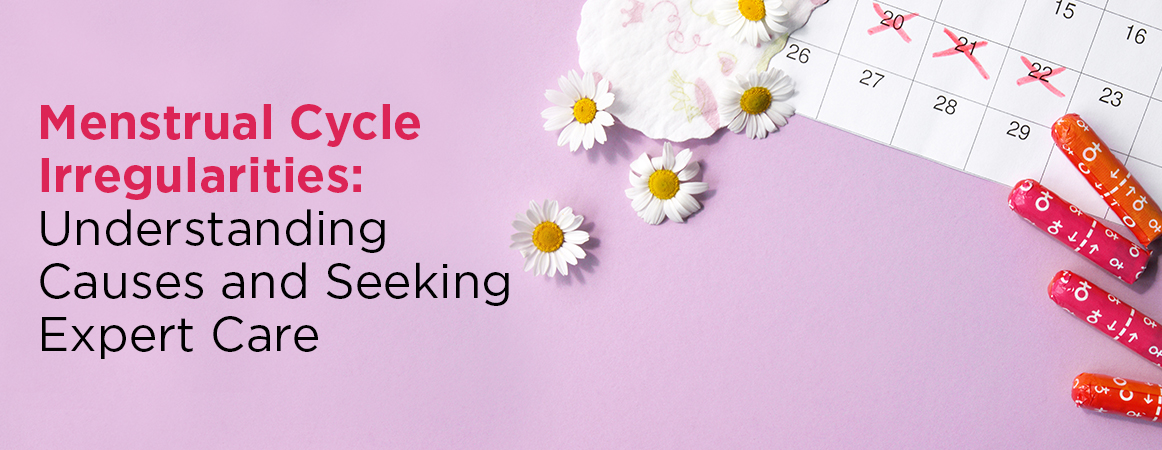Menstrual Cycle Irregularities: Understanding Causes and Seeking Expert Care
A regular menstrual cycle is a vital aspect of women’s reproductive health, reflecting the intricate balance of hormones in the body. However, many women experience menstrual cycle irregularities, which can disrupt daily life and signal underlying health issues.
Menstrual cycle irregularities, encompassing variations in cycle length, flow, and symptoms, hold immense significance in women’s health. Beyond impacting reproductive well-being, irregularities may signal hormonal imbalances, stress, or underlying medical conditions. Monitoring and addressing these irregularities are crucial, as they can provide valuable insights into overall health.
In this article, we will explore the common causes of menstrual irregularities, the importance of seeking expert care, and the role top gynecologists in Karachi and gynecologist hospitals play in addressing these concerns.
Understanding Menstrual Cycle Basics:
The menstrual cycle typically lasts 28 days, involving the release of an egg from the ovaries, preparation of the uterus for pregnancy, and shedding of the uterine lining if conception does not occur. However, variations in cycle length, flow, and symptoms can occur for numerous reasons.
Common Causes of Menstrual Irregularities:
a. Hormonal Imbalances: Fluctuations in hormonal levels, particularly estrogen and progesterone, can disrupt the regularity of menstrual cycles. Conditions like polycystic ovary syndrome (PCOS) and thyroid disorders often contribute to hormonal imbalances.
b. Stress and Lifestyle Factors: High levels of stress, inadequate sleep, and poor nutrition can impact the delicate hormonal equilibrium, leading to irregular periods. Adopting a healthy lifestyle can often help regulate the menstrual cycle.
c. Medical Conditions: Underlying medical conditions such as diabetes, pelvic inflammatory disease (PID), and endometriosis may contribute to menstrual irregularities. Identifying and addressing these conditions is crucial for restoring regular cycles.
The Importance of Seeking Expert Care:
Menstrual irregularities can be indicative of broader health issues, making it essential to consult top gynecologists in Karachi for a thorough evaluation. gynecologist specialists in Karachi possess the knowledge and diagnostic tools necessary to pinpoint the root causes of irregularities and formulate appropriate treatment plans.
Top Gynecologists in Karachi:
Seeking care from top gynecologists in Karachi ensures that women receive specialized attention and accurate diagnoses. These professionals have extensive experience in dealing with various gynecological issues, including menstrual irregularities. Regular check-ups with these specialists contribute to proactive management and early intervention when needed.
Diagnostic Procedures:
Top gynecologists utilize advanced diagnostic procedures, such as pelvic exams, ultrasound imaging, and blood tests, to assess hormonal levels and identify any abnormalities. These thorough assessments help in crafting personalized treatment strategies tailored to each patient’s unique needs.
Treatment Options for Menstrual Irregularities:
a. Hormonal Therapy: For hormonal imbalances, gynecologists may prescribe hormonal therapy to regulate menstrual cycles. Birth control pills, hormone replacement therapy, and other medications are commonly used to restore hormonal equilibrium.
b. Lifestyle Modifications: Addressing stress, maintaining a healthy diet, and incorporating regular exercise can positively impact menstrual regularity. Gynecologists often emphasize lifestyle modifications as part of holistic treatment plans.
c. Surgical Interventions: In certain cases, surgical interventions may be recommended to address structural abnormalities or conditions like endometriosis. Top gynecologist hospitals in Karachi, such as MMI, are equipped with state-of-the-art facilities for such procedures, ensuring optimal outcomes.
Preventive Measures and Self-Care:
Educating women about preventive measures and self-care practices is integral to managing menstrual irregularities. Gynecologists guide patients in maintaining overall well-being and recognizing early signs of potential issues.
Conclusion:
Menstrual cycle irregularities are common and can be indicative of various underlying factors. Seeking care from top gynecologists in Karachi and gynecologist hospitals is crucial for accurate diagnoses and effective management. By understanding the causes of irregularities and embracing comprehensive treatment approaches, women can regain control over their reproductive health and overall well-being.
Regular check-ups and a proactive approach to menstrual health empower women to navigate these challenges with confidence and live healthier lives.


